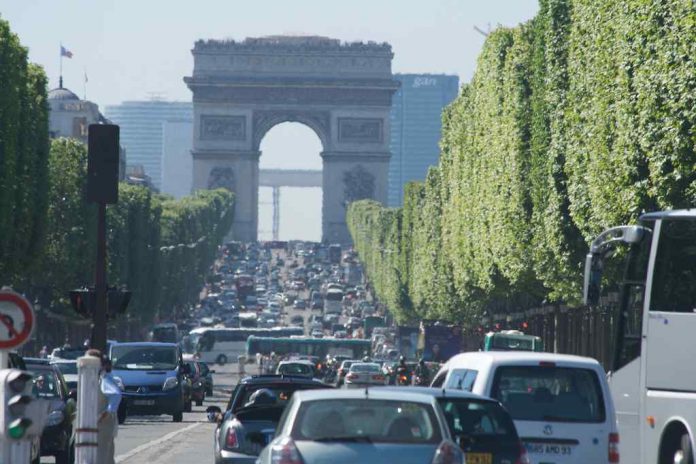Uber is adding more polluting car trips to already-clogged European cities such as London and Paris, new analysis suggests – contributing to air pollution and climate change and exploding the company’s sustainability claims.
Data compiled by Euromonitor for European research and campaign group Transport & Environment (T&E) shows a surge in the number of Uber drivers (officially registered as private hire vehicles – PHV) in the past few years. In France, which liberalised the taxi market in 2015, the number of reported PHV drivers doubled in three years (from more than 15,000 in 2016 to 30,000 in 2019). The number of Uber drivers in London almost doubled in three years (from 25,000 in 2016 to 45,000 in 2018), accounting for roughly half the total PHV licence number.
This has made Uber one of the biggest taxi services in Europe, with 3.6 million users in London in 2019 and with 2.7 million users in France in 2017. According to company documents issued for its stock market launch, Uber is looking to massively increase its operations worldwide and is eyeing Europe in particular, identifying Germany, Spain and Italy as priority markets for expansion.
But whilst the number of taxi licenses was historically capped through licenses, Uber has seen rapid growth. Since Uber’s arrival in London, its biggest European market, taxi and PHV trips have increased by roughly 25% in the capital. This data strongly correlates with a 23% increase in overall CO2 emissions for the taxi and PHV sector in the UK in the same period.
The analysis estimates that in London and Paris alone, the emissions of Uber taxi services could be as high as half a megatonne of CO2 – 515 kilotonnes of CO2. This is equivalent to adding the CO2 emissions of an extra 250,000 privately owned cars to the road.
These kilometers have predominantly been driven by petrol and diesel cars, exacerbating the air pollution crisis in European cities. Worryingly, French government data from 2017 show that 90% of the registered private hire vehicles, which includes Uber, were diesel cars. The high share of diesels in the PHV fleet can be also found in the traditional taxi market. It’s thought that other European cities where Uber operates have similar levels of diesels in their fleet.
“Uber’s CEO tells us they ‘do the right thing, period.’ But the reality is that Uber is part of the traffic and pollution problem, adding car trips in our cities and adding to the climate and pollution crisis. If it wants to become part of the solution Uber needs to stop using petrol and diesel cars and rapidly shift to 100% electric rides. That’s the right thing to do, full stop,” said Yoann Le Petit, new mobility expert with T&E.
The findings confirm that cities in Europe face the same challenges as American ones, such as New York, Boston, Chicago, and San Francisco, where Uber and Lyft have been shown to exacerbate pollution and congestion.
Global NGO campaign urges Uber to go clean and stop running dirty cars in our cities
A broad coalition of green NGOs in the US, Germany, France, the UK, The Netherlands and Belgium today launched the #TrueCostOfUber campaign. This collective action aims to tell concerned citizens and city authorities that Uber needs to clean up its act in order to operate in cities across Europe and the US. The company therefore needs to help their drivers switch to zero-emission cars as it is already doing in London thanks to the ultra-low emission zone in the capital.
The campaign in Europe calls on Uber to go 100% clean in large cities by 2025.
The coalition includes organisations such as the Sierra Club, Nabu, Respire, MilieuDefensie, Bond Beter Leefmilieu, Les Chercheurs d’Air and Transport & Environment. These organisations will take the campaign to the cities of Paris, Brussels, Berlin, Amsterdam, Antwerp, Manchester, among others, urging local authorities to clean up Uber.
“Uber and Lyft aren’t fooling anyone anymore with their greenwashing. Cities and countries around the world are beginning to see the companies for what they are: Corporate players putting profit over planet. You can’t claim sustainability if the data proves you’re doing the opposite– reducing transit ridership, worsening our air quality, and mistreating the people at the heart of your business model,” said Rebekah Whilden, campaign representative with the Sierra Club (USA).
“Brussels, the capital of Europe, seriously suffers from air pollution and congestion. It cannot afford companies like Uber adding to the diesel and gasoline cars on its streets. Uber must be part of the solution, not the problem,” added Pierre Dornier, president of the citizens movement Les chercheurs d’air (Brussels).
Flickr/Jürgen Glüe/CC BY-SA 2.0

Traffic in Paris.
